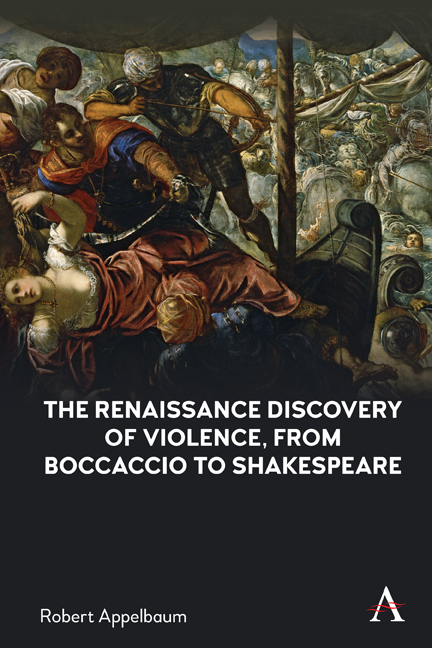Book contents
- Frontmatter
- Dedication
- Contents
- A Note on the Texts
- Acknowledgments
- Preface
- Chapter One Overture: The Show of Violence
- Chapter Two The Moral Economy of Violence in the Renaissance Novella Collection: Straparola, Bandello and Marguerite de Navarre
- Chapter Three Pacifism, Erasmus and More
- Chapter Four Violence as Labor: The Heroic Narrative
- Chapter Five “Tragedy Shows Us What We Must Flee From”
- Afterword
- Select Bibliography
- Index
- Frontmatter
- Dedication
- Contents
- A Note on the Texts
- Acknowledgments
- Preface
- Chapter One Overture: The Show of Violence
- Chapter Two The Moral Economy of Violence in the Renaissance Novella Collection: Straparola, Bandello and Marguerite de Navarre
- Chapter Three Pacifism, Erasmus and More
- Chapter Four Violence as Labor: The Heroic Narrative
- Chapter Five “Tragedy Shows Us What We Must Flee From”
- Afterword
- Select Bibliography
- Index
Summary
It can seem as if, from the novella early in the century to the flowering of tragedy later on, an advance has been made. Over the course of the sixteenth century, human suffering was little by little wrested from the complacent confines of the morality tale, or the jingoism of romantic fantasy, and worked into open-ended dramas of inescapable struggle, to which the proper response was pity, puzzlement, terror or horror and grief, mixed perhaps with indignation, and a wish for a better world, where the struggle will have been overcome. “The weight of this sad time we must obey,” says a character at the end of King Lear, “Speak what we feel, not what we ought to say” (5.3.298–99). We have arrived at what may seem to be a typically modern point of view. And perhaps, at least in some respects, we have. But the impression of progress may be an effect of a bias that has governed my choice of texts and themes, beginning with an inclination toward finding discoveries in literary history, points where new dimensions of human experience and sensibility seem to have been approached, observed and expressed. From Seneca or Bandello to Shakespeare, or from Gower to Erasmus, surely something has been achieved in human understanding, if achievements of the sort are what we are looking for. (And why should we not be looking for them?) But if we don't limit ourselves to the audacious masterpieces of the period, what then? We may be faced with a culture of indifferent disturbance. The impression of progress may be an effect of omission—of all the texts I have not had the opportunity to discuss, including a world of what are usually considered to be minor works, or nonliterary texts, some of which treated violence unthinkingly or gratuitously, or according to the moral standards which can no longer be to our taste. I think of a play I mentioned in the beginning of this study, Chantelouve's La Tragedie de feu Gaspar de Colligni, which delights in assassination, or again of Marlowe's Massacre at Paris, which delights in some sort of assassination and recoils indignantly at others, depending on whether the victim is Protestant or Catholic.
- Type
- Chapter
- Information
- Publisher: Anthem PressPrint publication year: 2021



